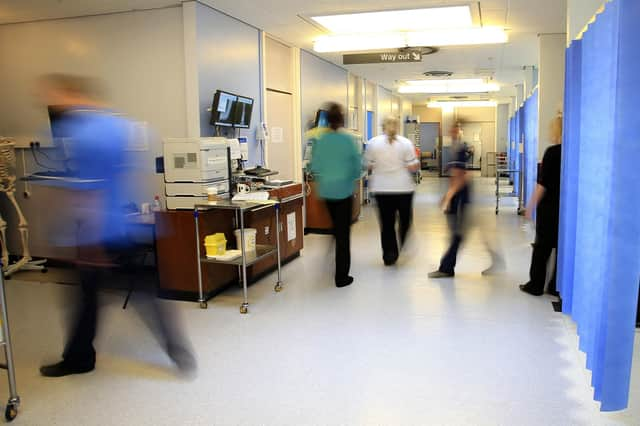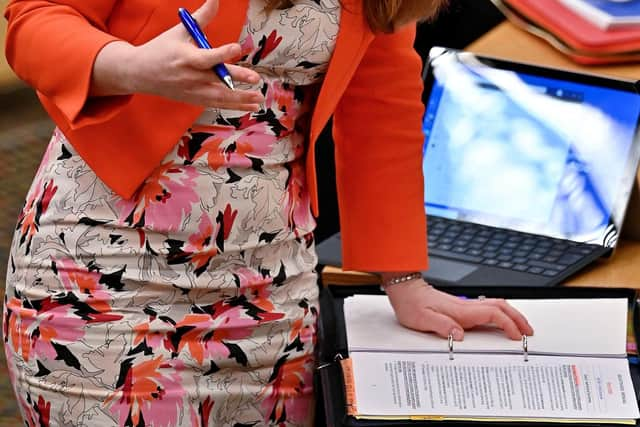Scottish Budget 2021: What exactly was announced?


But how will the figures announced affect daily life?
Health and social care
The Budget has provided record funding of £18 billion for Health and Social Care, including £12.9 billion for health boards, to ensure support through the pandemic and accelerate the recovery of “vital services”. The government has been criticised for a slow return to normal screening programmes and non-urgent surgery over the pandemic, where the NHS has been under extreme pressure.


However, the Scottish Government says the funding is not only to address immediate pressures on across the NHS, but also delivering the first step to ensure front-line funding which directly supports patient services increases by at least £2.5 billion by 2026-27.
Advertisement
Hide AdAdvertisement
Hide AdThe package also provides £1.2 billion for mental health and also confirms the £50 million Whole Family Wellbeing Fund to provide person-centred holistic support for children and their families.
Over £4 billion will be paid out across social security and welfare payments, providing support for low income families, carers and disabled
people – including £1.95 billion to start delivery of the Adult Disability Payment in 2022-23;
At total of £41 million will be given to the Scottish Welfare Fund, helping people in times of crisis, while £80.2 million is to fund Discretionary Housing Payments.
Young people will be able to travel free on Scotland’s buses from January due to £110 million of funding, which the government says will put more money in their pockets, and encourage more use of public transport.
Education and children
£145.5 million is to be given to pay for teachers and classroom assistants, enough to employ around 2,500 teachers and 500 support staff. This includes funding that will enable local authorities to employ additional staff recruited during the pandemic on permanent contracts.
Over £72 million has been pledged for the continued expansion of free school lunches – providing lunches for all children in P1-5 and special schools, and supporting the infrastructure required to ultimately roll-out lunches to all primary children. It will also provide over £21 million to continue the provision of free lunches during school holidays, focused on those who will benefit the most, and continue to work on a phased approach for the provision of a universal milk scheme.
A fund of £544 million will deliver free funded early learning and childcare for three and four year olds, and two year olds from lower income households, while continuing work to expand that to one year olds from low income households within this Parliament.
Advertisement
Hide AdAdvertisement
Hide AdIn a year which has seen a lot of focus on the poverty-related attainment gap as home learning appeared to exacerbate the existing problem, £200 million has been pledged as the next instalment of the government’s commitment to provide £1 billion over this Parliament to tackle the problem.
The Budget confirmed plans to double the Scottish Child Payment from April 2022, and extend it to under 16’s by the end of 2022, helping to lift an estimated 40,000 children out of poverty in 2023-2024. The payment, which will double to £20 per week, will be funded through a £197 million pledge.
Business
Rates relief for the retail, hospitality and leisure sectors will continue at 50 per cent for the first three months of 2022-23, capped at £27,500 per ratepayer. The measure, it is hoped, will prevent a cliff edge for businesses in those sectors, saving them a further £56 million.
Small businesses with a rateable value of less than £15,000 on a Scottish high street will continue to pay no rates for the entirety of next year, irrespective of what sector they are in, through the Small Business Bonus Scheme.
A fund of £205 million will go to capitalisation for the Scottish National Investment Bank, helping it deliver against its missions of supporting Scotland’s transition to net zero; building communities and promoting equality; and harnessing innovation.
Public sector
All public sector workers will see a minimum pay of £10.50 an hour – building on an uplift in pay for social care workers to £10.02 per hour in October – with additional funding for Local Government to ensure this applies to adult social care workers in commissioned services.
An inflationary uplift of at least £775 is guaranteed to those earning up to £25,000, £700 to those earning between £25,000 and £40,000, and £500 to those earning above £40,000
Taxation
Scottish income tax is to "remain unchanged", with starter and basic rate bands increasing in line with inflation and higher and top rates remaining frozen at current levels. This will mean that more people will slip into the highest rate of income tax, although the Scottish Government says that the policy means that the majority of Scottish taxpayers will continue to pay less income tax than if they lived elsewhere in the UK.
Advertisement
Hide AdAdvertisement
Hide AdThe current council tax freeze will be scrapped. The Scottish Government said it would provide full flexibility to local authorities in setting council tax rates – enhancing their fiscal autonomy – which could result in local rises in taxation as councils look to increase their budgets to fund local services.
Both residential and non residential rates and bands on land and buildings transaction tax will remain at their current levels next year. The government said it would soon launch a call for evidence and views on changing the additional dwelling supplement.
The Budget also unveiled plans to “imminently” begin secondary legislation on a Workplace Parking Levy and also resume work on the Visitor Levy proposal.
A message from the Editor:
Thank you for reading this article. We're more reliant on your support than ever as the shift in consumer habits brought about by Coronavirus impacts our advertisers.
If you haven't already, please consider supporting our trusted, fact-checked journalism by taking out a digital subscription.
Comments
Want to join the conversation? Please or to comment on this article.
